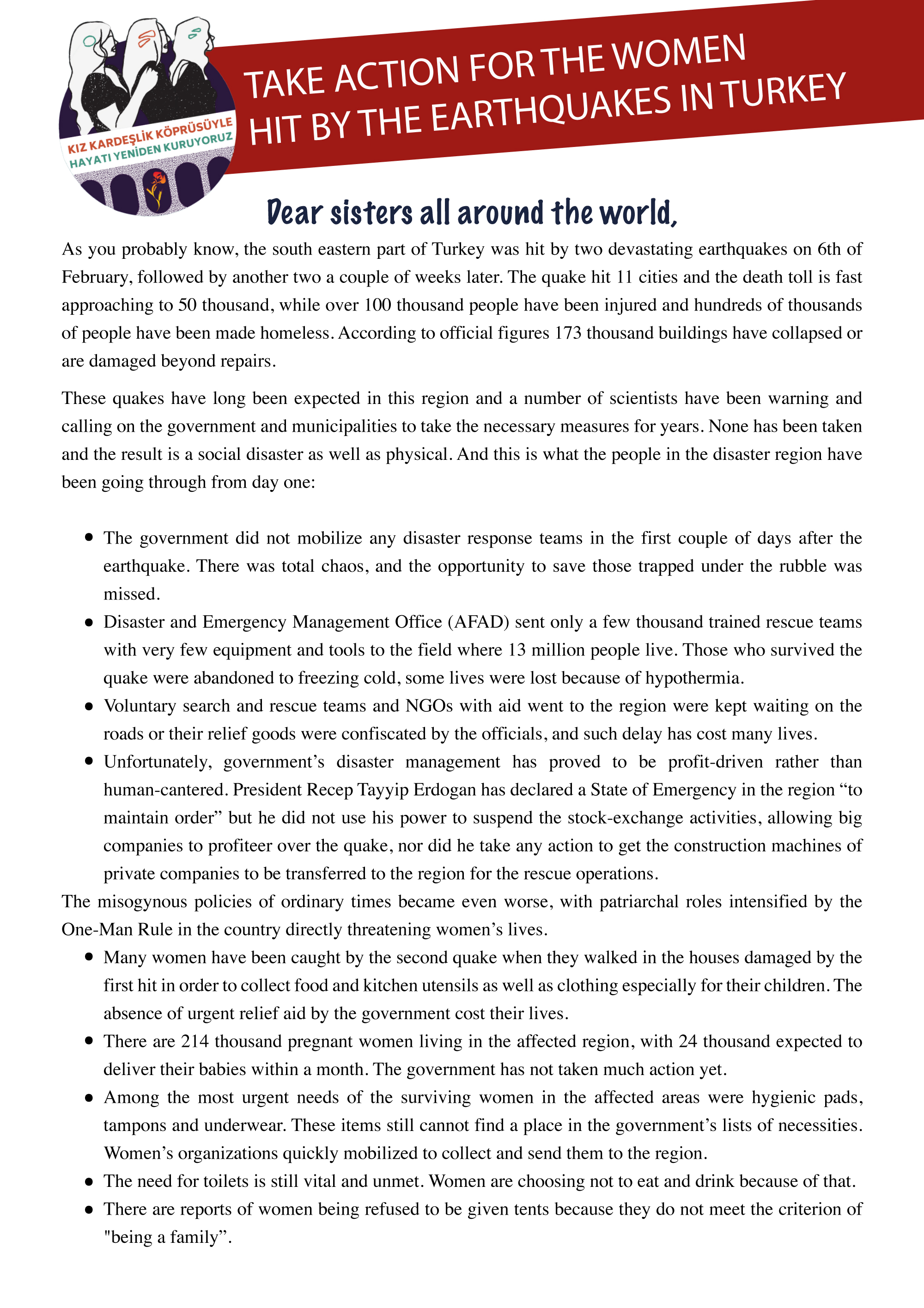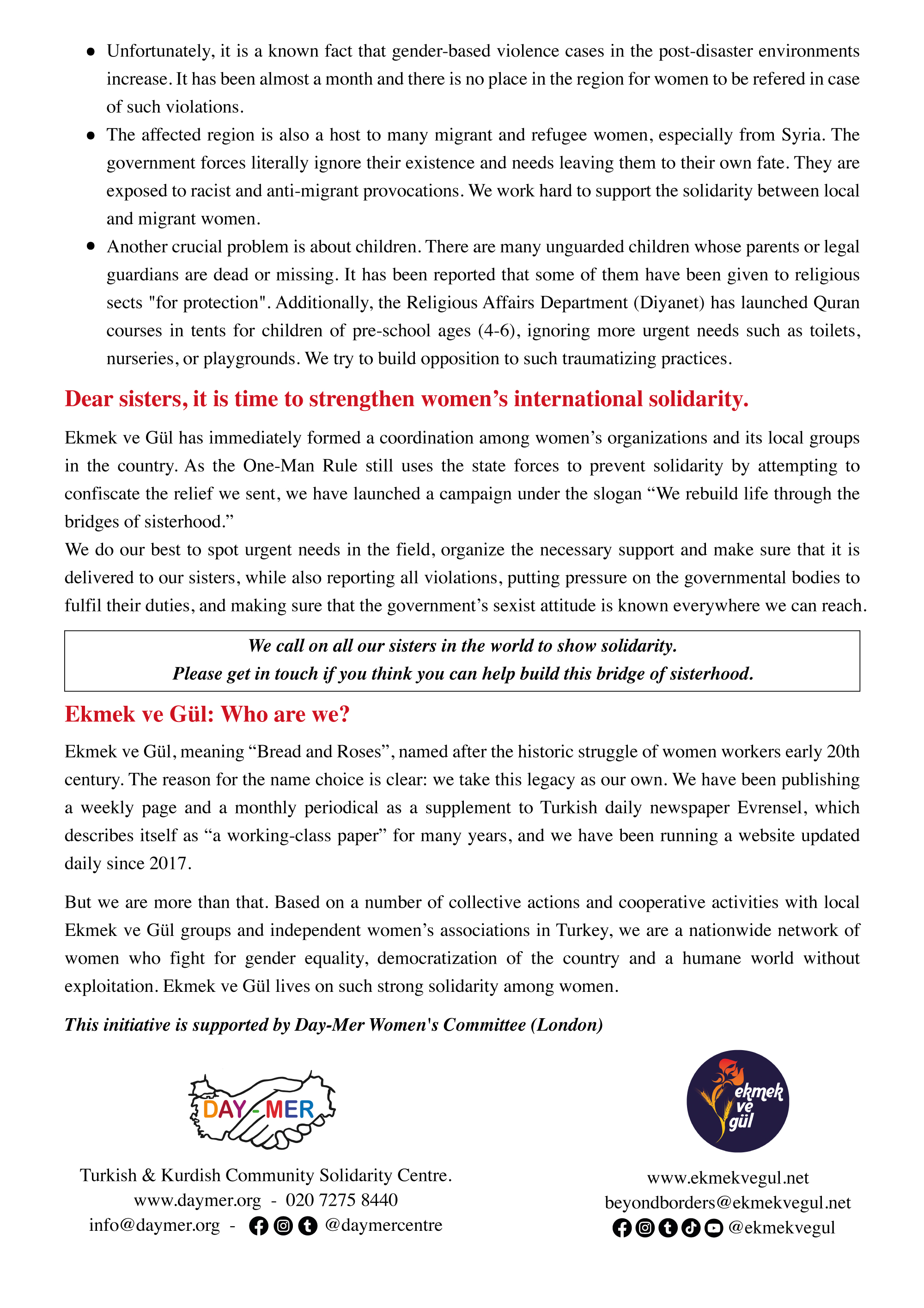Events
Dear sisters all around the world,
As you probably know, the south eastern part of Turkey was hit by two devastating earthquakes on 6th of February, followed by another two a couple of weeks later. The quake hit 11 cities and the death toll is fast approaching to 50 thousand, while over 100 thousand people have been injured and hundreds of thousands of people have been made homeless. According to official figures 173 thousand buildings have collapsed or are damaged beyond repairs.
These quakes have long been expected in this region and a number of scientists have been warning and calling on the government and municipalities to take the necessary measures for years. None has been taken and the result is a social disaster as well as physical. And this is what the people in the disaster region have been going through from day one:
- The government did not mobilize any disaster response teams in the first couple of days after the earthquake. There was total chaos, and the opportunity to save those trapped under the rubble was missed.
- Disaster and Emergency Management Office (AFAD) sent only a few thousand trained rescue teams with very few equipment and tools to the field where 13 million people live. Those who survived the quake were abandoned to freezing cold, some lives were lost because of hypothermia.
- Voluntary search and rescue teams and NGOs with aid went to the region were kept waiting on the roads or their relief goods were confiscated by the officials, and such delay has cost many lives.
- Unfortunately, government’s disaster management has proved to be profit-driven rather than human-cantered. President Recep Tayyip Erdogan has declared a State of Emergency in the region “to maintain order” but he did not use his power to suspend the stock-exchange activities, allowing big companies to profiteer over the quake, nor did he take any action to get the construction machines of private companies to be transferred to the region for the rescue operations.
The misogynous policies of ordinary times became even worse, with patriarchal roles intensified by the One-Man Rule in the country directly threatening women’s lives.
- Many women have been caught by the second quake when they walked in the houses damaged by the first hit in order to collect food and kitchen utensils as well as clothing especially for their children. The absence of urgent relief aid by the government cost their lives.
- There are 214 thousand pregnant women living in the affected region, with 24 thousand expected to deliver their babies within a month. The government has not taken much action yet.
- Among the most urgent needs of the surviving women in the affected areas were hygienic pads, tampons and underwear. These items still cannot find a place in the government’s lists of necessities. Women’s organizations quickly mobilized to collect and send them to the region.
- The need for toilets is still vital and unmet. Women are choosing not to eat and drink because of that.
- There are reports of women being refused to be given tents because they do not meet the criterion of "being a family”.
- Unfortunately, it is a known fact that gender-based violence cases in the post-disaster environments increase. It has been almost a month and there is no place in the region for women to be refered in case of such violations.
- The affected region is also a host to many migrant and refugee women, especially from Syria. The government forces literally ignore their existence and needs leaving them to their own fate. They are exposed to racist and anti-migrant provocations. We work hard to support the solidarity between local and migrant women.
- Another crucial problem is about children. There are many unguarded children whose parents or legal guardians are dead or missing. It has been reported that some of them have been given to religious sects "for protection". Additionally, the Religious Affairs Department (Diyanet) has launched Quran courses in tents for children of pre-school ages (4-6), ignoring more urgent needs such as toilets, nurseries, or playgrounds. We try to build opposition to such traumatizing practices.
Dear sisters, it is time to strengthen women’s international solidarity.
Ekmek ve Gül has immediately formed a coordination among women’s organizations and its local groups in the country. As the One-Man Rule still uses the state forces to prevent solidarity by attempting to confiscate the relief we sent, we have launched a campaign under the slogan “We rebuild life through the bridges of sisterhood.” We do our best to spot urgent needs in the field, organize the necessary support and make sure that it is delivered to our sisters, while also reporting all violations, putting pressure on the governmental bodies to fulfil their duties, and making sure that the government’s sexist attitude is known everywhere we can reach.
We call on all our sisters in the world to show solidarity. Please get in touch if you think you can help build this bridge of sisterhood.
Ekmek ve Gül: Who are we?
Ekmek ve Gül, meaning “Bread and Roses”, named after the historic struggle of women workers early 20th century. The reason for the name choice is clear: we take this legacy as our own. We have been publishing a weekly page and a monthly periodical as a supplement to Turkish daily newspaper Evrensel, which describes itself as “a working-class paper” for many years, and we have been running a website updated daily since 2017.
But we are more than that. Based on a number of collective actions and cooperative activities with local Ekmek ve Gül groups and independent women’s associations in Turkey, we are a nationwide network of women who fight for gender equality, democratization of the country and a humane world without exploitation. Ekmek ve Gül lives on such strong solidarity among women.
This initiative is supported by Day-Mer Women's Committee (London)



